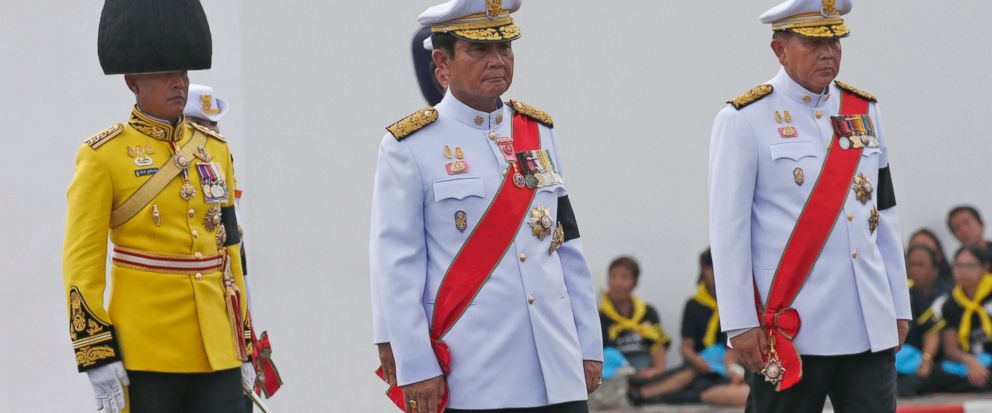Thai junta firmly in command after year of mourning for king
Thailand's military government has emerged from the year of official mourning for King Bhumibol Adulyadej with a firm grip on power and in no apparent rush to hold elections it has repeatedly delayed during the four years since its coup.
The five days of solemn and choreographed spectacle for Bhumibol's funeral last month was a mostly unblemished propaganda triumph for the junta that underlined its primacy and the sidelining of political parties.
After a reign of seven decades, Bhumibol's death in October last year at age 88 was anticipated with trepidation by many Thais who feared greater instability without a traditional unifying figure.
In reality, Bhumibol's power to sway events was more mythic than actual, particularly as his health faded in the last decade. Even so, the junta and Prime Minister Prayuth Chan-ocha have burnished their image and stocked up on public goodwill by presiding calmly over an anxious period, said Kevin Hewison, an emeritus professor of Asian studies at the University of North Carolina.
"There was talk of a succession crisis, violence and all sorts of things but none of it happened," said Hewison.
"All the political parties look disorganized and not prepared for an election," he said. "The military has got the whip hand."
Thailand, the top tourist destination in Southeast Asia and a long-standing U.S. ally, has suffered more than a decade of upheaval, including two coups, as its conservative establishment struggled to stifle a grassroots political revolution fostered by the electoral success of billionaire businessman Thaksin Shinawatra. His leadership was marred by corruption and human rights abuses and he now lives abroad in exile, but the political earthquake he unleashed with policies aimed at improving the lot of the country's poor rural majority continues to reverberate.
Prayuth's latest vague promise for elections is November 2018, but the junta's ban on political activities remains in place and major parts of the legal and administrative groundwork for elections, required by Thailand's new constitution, are still not completed.
The current military rulers are determined to avoid what they consider the mistakes made by the generals that ousted Thaksin in 2006 but didn't eradicate his political machine.
Thaksin's rural and working class "Red Shirt" supporters easily won every election held in the following decade, putting the military and other traditional arbiters of power in Thailand on the back foot. This time, the junta hopes to create a "very muffled democracy" that deprives the winning party or electoral coalition of a real ability to govern, said David Streckfuss, a scholar specializing in Thailand.
The constitution put in place under the junta government is likely to prevent any political party from gaining a majority and whatever coalition emerges is likely to have a prime minister imposed from outside, said Chaturon Chaisaeng, a former deputy prime minister and leading figure in the Thaksin-allied Pheu Thai party that was ousted in a 2014 coup.
"They are rules that are very undemocratic. Extremely undemocratic," he said. "The elections that will take place will not mean as much as elections do in other countries."
The latest chapter in the decadelong struggle between Thailand's ruling classes and grassroots democrats unfolded in September when former Prime Minister Yingluck Shinawatra, the younger sister of Thaksin, fled the country to evade prison.
Yingluck, ousted in the 2014 coup and derided by her many critics in Thailand as a bumbling proxy for her exiled brother, was accused of negligence in instituting a money-losing rice subsidy program and sentenced to five years in prison. A top minister in her government was sentenced to 42 years in prison and is appealing. Many influential Red Shirt activists and organizers have been cowed by government pressure.
In a sign Prayuth feels under no pressure to cede power, he is already threatening to prolong the ban on political activities by referring to his dissatisfaction with a lack of calm and order in society.
"The red heart is barely beating at the moment," said Hewison.
Prayuth's government does crave international respectability but that impulse to quickly hold elections has lessened with the administration of President Donald Trump apparently unwilling to lean too heavily on its Thai ally at a time of growing Chinese influence in Southeast Asia.
Critics of the junta also currently seem willing to accept the diluted democracy it may eventually get around to offering.
Chaturon said the Pheu Thai party is likely to contest elections though it hasn't made a formal decision yet.
Worawut Wichaidit, a spokesman for the anti-junta group United Front for Democracy Against Dictatorship, said having an election is better than even if the new government is hamstrung.
"This unelected government has been in power for almost four years now and we all see that the country's economy is disastrous. The rich are extremely satiated and poverty is everywhere," he said.
Streckfuss, who is based in Thailand's northeast, said an election next year would open the possibility for wider political debate than at present.
However, changes to the junta's democracy-limiting constitution would be impossible without major upheaval, he said.
The military has "tamped down, talked down, stamped down" the democratic politics of the past decade but the long-standing tensions between the haves and have-nots of Thailand's economic development will not go away, he said.
———
Associated Press writer Kaweewit Kaewjinda contributed to this report.
———
Follow Wright on Twitter at twitter.com/@stephenwrightAP
- Star

